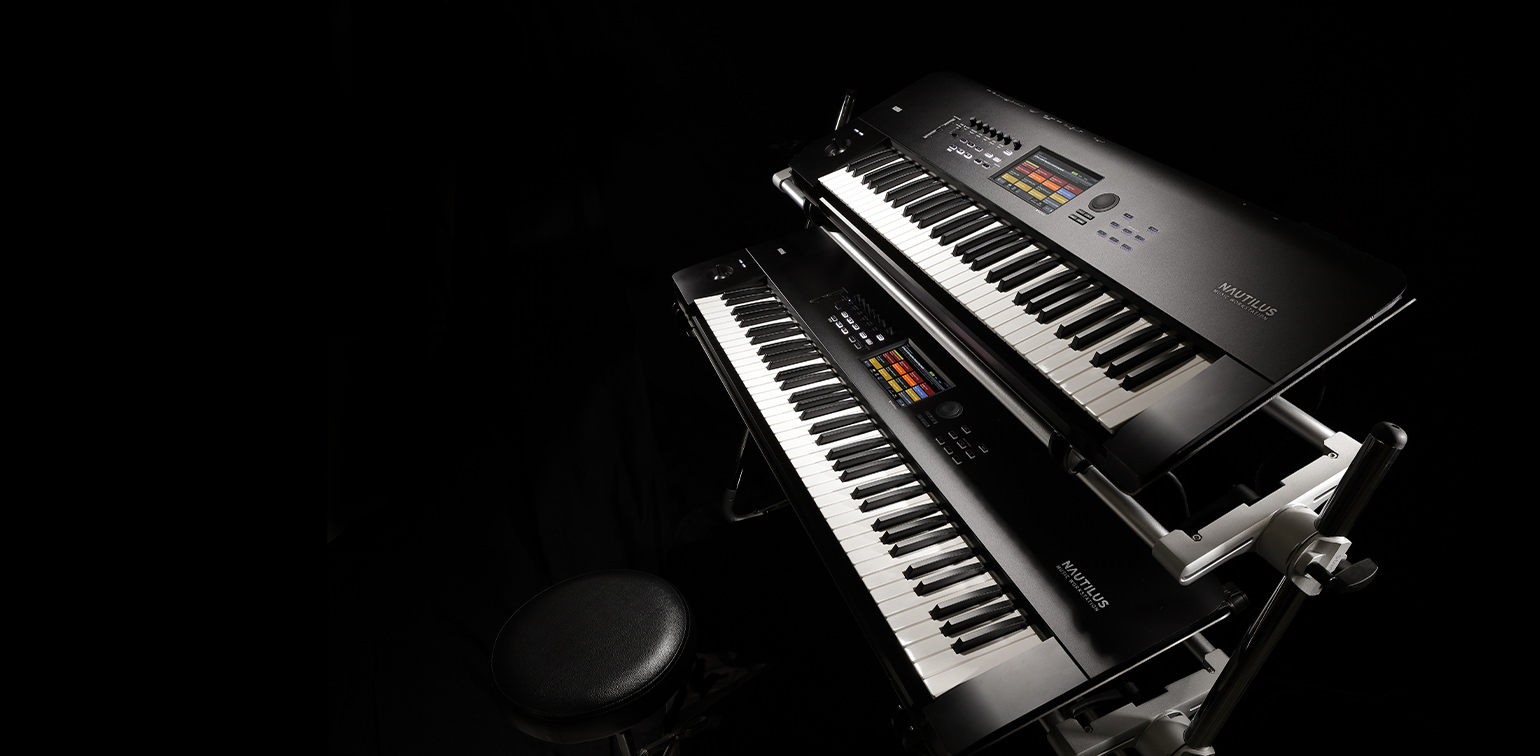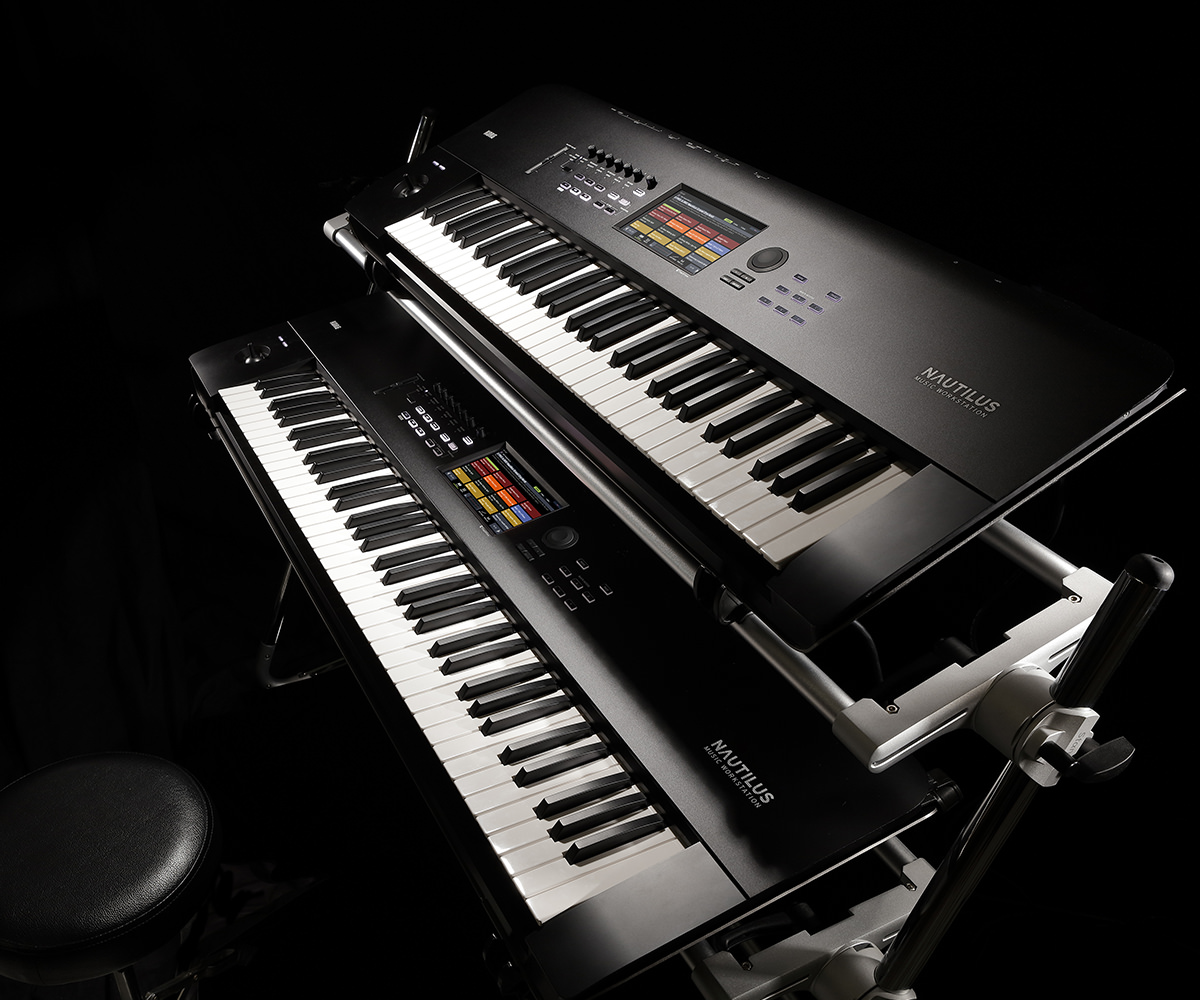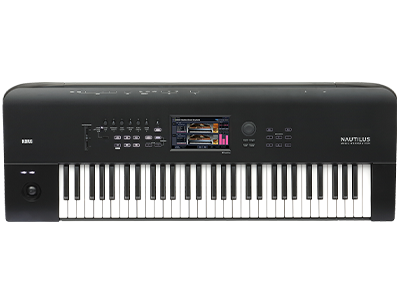

SoundCloud

NAUTILUS
MUSIC WORKSTATION
Ondersteuning
Lees meer
Gerelateerde websites
Gerelateerde producten
Nieuws
- 2024.12.20
- Updates - NAUTILUS Editor/Plug-In Editor for Win v1.3.0 is now available!
- 2024.12.16
- NAUTILUS/KRONOS Sound Libraries: New/Update libraries from KORG and Kelfar Technologies
- 2024.10.08
- NAUTILUS/KRONOS Sound Libraries: A new library from KORG
- 2024.07.04
- NAUTILUS/KRONOS Sound Libraries: New libraries from KORG and Kelfar Technologies
- 2023.12.15
- NAUTILUS/KRONOS Sound Libraries: New/Update libraries from KORG and Kelfar Technologies
System, Keyboard
- System
- NAUTILUS System Version 1.0
- Keyboard
-
88 key: RH3 (Real Weighted Hammer Action 3), A - C
73 key: Natural Touch Semi Weighted, C - C
61 key: Natural Touch Semi Weighted, C – C
Velocity sensitive is supported, after touch is not supported.
Tone Generator
- Synthesis Types
-
9
SGX-2: Premium Piano (Acoustic Piano)
EP-1: MDS Electric Piano (Electric Piano)
HD-1: High Definition Synthesizer (PCM)
AL-1: Analog Synthesizer (Analog Modeling)
CX-3: Tonewheel Organ (Tonewheel Organ Modeling)
STR-1: Plucked String (Physical Modeling)
MOD-7: Waveshaping VPM Synthesizer (VPM Synthesis)
MS-20EX: Component Modeling Technology (Analog Modeling)
PolysixEX: Component Modeling Technology (CMT Analog Modeling)
- Maximum Polyphony*1*2
-
SGX-2: 100 voices*3
EP-1: 104 voices
HD-1: 140 voices
AL-1: 80 voices
CX-3: 200 voices
STR-1: 40 voices
MOD-7: 52 voices
MS-20EX: 40 voices
PolysixEX: 180 voices
1: In rare cases, when a large number of processor-intensive effects are active simultaneously (for instance, more than 14 O-Verbs), polyphony may be slightly reduced.
*2: A portion of the multicore processor in NAUTILUS is devoted to generating voices, and a separate portion is devoted to generating effects. NAUTILUS dynamically allocates the voice processing power between the engines as necessary. The quoted maximum numbers of voices apply when 100% of the voice processing power is devoted to a single engine.
*3: 100 dual-stereo notes (equivalent to 400 mono voices)
- Preset PCM
- RAM 496 MB / DISK 2.3G (ROM 1,771 Multisamples, 3,955 Drumsamples)
- Build-in Expansion PCM Libraries
-
EXs301: German2 D Piano
EXs302: Italian F Piano
EXs303: Japanese Upright U Piano
EXs304: Prepared Piano
EXs305: Historical Keyboards
EXs306: Vintage Keyboards 2
EXs307: Strings & Synths
EXs308: Guitar Collection
EXs309: Bass Collection
EXs310: World Essence
EXs311: Background Loops
EXs312: SFX & Hits
EXs313: Found Percussions
EXs314: Expansion Drums
- PCM RAM Capacity
-
Approx. 2GB *4
*4: The memory available for Sampling Mode will change based on the use of Expansion PCM libraries and User Sample Banks. Approx. 260 MB is available when shipped from the factory (When loading the file named “PRELOAD.KSC”).
- Wave Sequences
-
598 User memory, 377 Preload
Support for stereo multisamples, synchronization of individual notes, and tempo-based settings.
SGX-2 Program
- Premium Piano
-
Full key stereo sampling, Chromatically sampled at up to 12 velocity levels, no looping.
Damper resonance and mechanical noise are reproduced.
Una Corda sample support
- PCM
-
EXs301 – German2 D Piano
12 velocity levels, includes Ambience Piano type/samples
EXs302 – Italian F Piano
12 velocity levels, no Una Corda samples
EXs303 – Japanese Upright U Piano
8 velocity levels
Exs304 – Prepared Piano
1-4 velocity levels
- Piano Type
-
128
(With the factory settings, the 64 varieties of EXs6: German D Piano, EXs7: Japanese C Piano, EXs12: SGX-1 Austrian D Piano, EXs17: Berlin D Piano do not produce sound. The options must be downloaded. (Those will be released at a later date.))
- Oscillator Control
-
Damper Resonance
Damper Noise
Mechanical Noise
Note Release
String Resonance
Una Corda
EP-1 Program
- MDS Electric Piano
- Tine and reed-type electric pianos powered by Multi-Dimensional Synthesis (MDS), and vintage effects.
- Electric Piano Model Types
-
7
Tine EP I Early, Tine EP I Late, Tine EP II, Tine EP V, Tine EP DMP, Reed EP200, Reed EP200A
- Oscillator Control
- Harmonic Sound Level, Attack Noise, Level, Release Noise Level, Attack Brightness, Hammer Width
- Panel Control
-
Tine Type
Preamp Volume, Tone (Treble, Bass), Vibrate (On/Off, Intensity, Speed), Amp/Cabinet (On/Off, Drive)
Reed Type
Preamp Volume, Tone (Treble, Bass), Vibrate (Intensity, Speed), Amp/Cabinet (On/Off, Drive)
- Effect Types
-
9
Small Phase, Orange Phase, Black Phase, Vintage Chorus, Black Chorus, EP Chorus, Vintage Flanger, Red Comp, VOX Wah
HD-1 Program
- Advanced Vector Synthesis
- Control oscillator volumes and synthesis & effects parameters via the Vector Joystick and the tempo-synchronized Vector Envelope.
- Structure
-
Single: only OSC1, Double: OSC1 and OSC2.
Double mode lets you layer two completely separate synth voices, each with their own velocity-switched oscillator, dual filter, EGs, LFOs, etc.
Drums: One drum kit, Double Drums: Two drum kits.
- Oscillators
-
8 velocity zones per oscillator, with switching, crossfades and layering
Each zone can play mono or stereo Multisamples or Wave Sequences
- Filters
- Two multi-mode filters per voices (low-pass, high-pass, band-pass and band-reject), Four-mode filter routings (single, serial, parallel and 24dB mode)
- Driver
- Per voice non-linear driver and low boost circuit
- EQ
- Three bands, with sweep-able mid
- Modulation
- Three envelope generators, two LFOs per voice, common LFO, four key tracking generators, AMS (Alternate Modulation Source), two AMS mixers
- Quick Layer / Split function
EXi Program Common
- Advanced Vector Synthesis
- Control oscillator volumes and synthesis & effects parameters via the Vector Joystick and the tempo-synchronized Vector Envelope
- Modulation
- Common Step Sequencer, AMS (Alternate Modulation Source), Common LFO, 2 Key Tracking Generators
- EQ
- Three bands, with sweep-able mid
- Quick Layer / Split function
AL-1 Program
- Oscillators
- Ultra-low-aliasing oscillators, OSC1, OSC2, Sub-oscillator and noise generator; ring modulation, FM and Sync
- Audio Input
- External audio can be processed through the ring modulator, filter, driver, amp, and EQ
- Filters
- Two multi-mode filters (low-pass, high-pass, band-pass and band-reject) with four types of filter routings (single, serial, parallel and 24dB mode), Multi Filter mode (only Filter-A; modulatable mix of Low Pass, High Pass, Band Pass, and dry input, for creating a wide variety of unique filter types and effects)
- Driver
- Per-voice non-linear driver and low boost circuit
- Modulation
- Five Envelope generators, four per-voice LFOs, two AMS Mixers; Per-voice Step Sequencer
CX-3 Program
- Tonewheel Organ Modeling
- Phase-synchronous tonewheels (clean and vintage modes), percussion, key click, wheel brake
- EX Mode
- Four additional, user-specified drawbars, and expanded percussion
- Internal Effects
- Rotary speaker, vibrato/chorus, amp modeling with overdrive, 3-band EQ
- Drawbar Control
- Controlled via nine front-panel sliders (via Tone Adjust)
- Split
- Upper, Lower (even in EX mode)
- Modulation
- Two AMS mixers
STR-1 Program
- Physically Modeled String
- Includes physically modeled damping, decay, dispersion, nonlinearity, harmonics, dual pickups, and more. Most string parameters can be controlled in realtime
- String Excitation
-
Three independent excitation sources can be used simultaneously: Pluck, Noise, and PCM. 16 preset “pluck” types, with modulatable width and randomization. Noise generator with saturation and dedicated low pass filter
PCM Oscillator
KORG’s ultra-low-aliasing technology, as introduced in the HD-1; 4 velocity zones per oscillator; Uses any mono Multisamples, including ROM, EXs, User Sample Bank, or Sampling Mode. Supports Virtual Memory.
Excitation Filter
Dedicated 2-pole multimode filter for shaping the string excitation. Filter can be enabled/disabled separately for each excitation source. Low Pass, High Pass, Band Pass, and Band Reject modes
- Audio Input and Feedback
- Run real-time audio through the string, including feedback through effects. Modeled feedback includes modulate-able instrument-to-amp distance and orientation
- Filters
-
Dual multi-mode filters per voice; Single, Serial, Parallel (with split stereo output), and 24dB (4-pole) configurations. Low Pass, High Pass, Band Pass, and Band Reject modes
Multi Filter Mode (Filter A only)
Modulatable mix of Low Pass, High Pass, Band Pass, and dry input, for creating a wide variety of unique filter types and effects
- Modulation
- 5 Envelopes, 4 per-voice LFOs, 2 Key Track generators, String Tracking generators, 4 AMS Mixers
MOD-7 Program
- Waveshaping VPM Synthesizer
- Combines Variable Phase Modulation (VPM), Waveshaping ring modulation, PCM sample playback, and subtractive synthesis; Able to convert-load SYX files
- Oscillators
-
6 VPM/Waveshaper/Ring Modulation Oscillators
Phase and modulatable pitch per oscillator. 101 Waveshaper tables plus modulatable Drive and Offset. Use as oscillators, or as Waveshapers or Ring Modulators for other signals
PCM Oscillator
KORG’s ultra-low-aliasing technology, as introduced in the HD-1. 4 velocity zones per oscillator.Uses any mono Multisamples, including ROM, EXs, User Sample Bank, or Sampling Mode. Supports Virtual Memory
Noise Generator (With saturation and low-pass filter function)
- Audio input
- Run real-time audio through the VPM Oscillators and filters.
- Filters
-
Dual multi-mode filters per voice. (Low Pass, High Pass, Band Pass, and Band Reject modes) , Two types of filter looping (Parallel and 24 dB “4-Pole”)
Multi Filter mode (Filter A only)
Modulatable mix of Low Pass, High Pass, Band Pass, and dry input, for creating a wide variety of unique filter types and effects
- Patch Panel
- Supports both preset algorithm (78 types) selection and free patching.Three 2-in, 1-out mixers for scaling and merging audio, fully modulatable, with phase inversion. Main 6-input stereo mixer, with modulatable pan and volume, plus phase inversion
- Modulation
- 10 Envelopes, 4 per-voice LFOs, 9 Key Tracking generators, Per-voice Step Sequencer, 4 standard AMS Mixers plus 4 simple AMS Mixers
MS-20EX Program
- Oscillators
- Ultra-low-aliasing oscillators; VCO1, VCO2, Ring Mod, Pink and White Noise Generator
- Audio Input
- Run real-time audio through the synthesis engine and ESP (External Signal Processor)
- Filters
-
12dB/octave High Pass and Low Pass self-resonant filters
ESP section
24dB/octave Low Cut and High Cut filters, available per voice.
- Patch Panel
- Patchable audio and modulation, at audio rates
- Patch Points
-
Keyboard
Keyboard CV Out, Keyboard Trigger Out, VCO1+VCO2 CV In, VCO2 CV In
VCO
VCO1+VCO2 External Frequency Control In, VCO1 Out, VCO2 Out
VCF
External Signal In, External HP Filter Cutoff Frequency Control In, External LP Filter Cutoff Frequency Control In, HPF Out, LPF In, LPF Out
VCO+VCF
Total External Modulation In
VCA
External Initial Gain Control In, VCA In
EG
EG1 Envelope Signal Normal Out, EG1 Envelope Signal Reverse Out, EG1+EG2 Trigger In, EG1 Trigger In, EG2 Envelope Signal Reverse Out
MG
Triangle Out, Rectangle Out
Noise Generator
Pink Noise Out, White Noise Out
Sample and Hold
Clock Trigger In, Sample Signal In, S/H Out
Modulation VCA
Control Voltage In, Signal In, Signal Out
Manual Controller
Control Wheel Out, Momentary Switch
ESP
Signal In, AMP Out, BPF In, BPF Out, F-V CV Out, Envelope Out, Trigger Out
Others
EXi Audio In, Mixer 1 In, Mixer 1 Out, Mixer 2 In, Mixer 2 Out
- ESP (External Signal Processor):
- Use incoming audio as a trigger and/or CV source
- Modulation
- Original DAR (Delay, Attack, Release) and HADSR (Hold, Attack, Decay, Sustain, Release) EGs 1 &2, Original MG (with MIDI sync), Sample-and- Hold, MVCA, NAUTILUS: 4 additional multi-stage Envelopes, 4 additional per-voice LFOs, and 4 AMS Mixers.
PolysixEX Program
- Oscillators
-
VCO
Saw, Pulse, PWM
Sub Oscillator:
Off, 1 octave below, 2 octaves below
- Filter
- 24dB(4-Pole) Octave Low Pass self-resonant filter
- Effects
- Integrated Polysix Chorus, Phaser, and Ensemble
- Arpeggiator
- Integrated MIDI-synced arpeggiator, with adjustable Range, Mode, and Latch
- Modulation
-
Polysix
Original ADSR EG and MG (with MIDI sync).
NAUTILUS
2 additional multi-stage Envelopes, 2 additional per-voice LFOs, and 4 AMS Mixers.
Combination
- Number of Timbres, Master Keyboard Functionality
-
16 Maximum
Keyboard and velocity splits, layers, and crossfades of up to 16 Programs and/or external MIDI Devices
The tone adjust parameter function lets you modify program settings, and the master keyboard function lets you control external MIDI devices
- Advanced Vector Synthesis
- Control oscillator volumes and synthesis & effects parameters via the Vector Joystick and the tempo-synchronized Vector Envelope
- Quick Layer / Split function
Drumkit
Assignable stereo/mono samples with 8 velocity zones per oscillator (with crossfade functions)
Number of Programs/Combinations/Drum kits
- User Memory Programs
- 2,560 (1,920 [1,280 HD-1+640 EXi] come preloaded)
- User Memory Combinations
- 1,792 (256 come preloaded)
- User Memory Drum Kits
- 264 (104 come preloaded)
- 256 GM Level2 preset programs + 9 GM Level 2 drum preset programs
Set List
- Number of Set Lists/Slots
-
128 set lists, 128 slots per set list
Each set list provides a 9-band graphic EQ, and a Tone Adjust function that allows program settings to be adjusted
Transpose setting
Hold Time setting of Smooth Sound Transition (SST) supported for each slot
Sampling
- System
- Open Sampling System (resampling, In-Track sampling)
- Bit Depth/Sampling Frequency
-
RAM
16-bit/48 kHz stereo/mono sampling
DISK
16 or 24-bit/48 kHz
- Sampling Time
-
RAM
Depends on the amount of available PCM RAM
DISK
Maximum 80 minutes stereo (879MB: 16bit)
- Sample Locations
- 16,000 samples/4,000 multisamples (128 indexes per multisample)
- Formats
- KORG format, AKAI S1000/S3000 data (with advanced Program parameter conversion); SoundFont 2.0, AIFF, and WAVE formats
- Editing
- Time Stretch, Time Slice, Crossfade Loop, and other standard editing features.
Effects
- Insert Effects
-
12
Stereo in / stereo out
- Master Effects
-
2
Stereo in / stereo out
- Total Effects
-
2
Stereo in / stereo out
- Timbre EQ
- One 3-band EQ for each timbre/track
- Effect Types
- 197
- Modulation
- Dynamic Modulation and Common LFO
- Effects Control Busses
- Stereo side-chaining for compressors, gates, vocoders, etc
- Effect Presets
- Total 783 preset, Maximum 32 per 1 effect (Preset User)
Arpeggiator
- Arpeggiator Modules
- One module in Program mode, two modules in Combination and Sequencer modes
- Arpeggio Pattern
- 5 presets + ARP A 2,048 slots (1,593 come Preload) + ARP B 128 slots
- Controllers
- On/Off, Latch, Gate, Velocity, Length, Swing, Tempo
Drum Track
- Preset Patterns
- 1,272 (common with the preset patterns of the MIDI sequencer)
- User Patterns
-
1,000
Patterns created in Sequencer mode can be converted to drum track user patterns.
- Trigger Mode/ Sync / Zone / Swing, Drum SD, Tempo settings can be specified.
Sequencer / HDR
- Tracks
- 16-track MIDI sequencer + 16-track hard disk recorder + 1 master track.
- Number of Songs
- 200
- Resolution
- 1/480
- Tempo
- 40.00 – 300.00 (1/100 BPM resolution)
- Maximum Memory
- 400,000 MIDI events or 300,000 audio events
- MIDI Tracks
- 16 tracks plus the master track, 697 preset / 100 user patterns (per song), 18 preset/16 user template songs,
- Audio Tracks
-
16-track playback, 4-track simultaneous recording, WAV file format 16bit/24bit
Maximum Single-file Recording Time (mono): 80 minutes
Automation: Volume, Pan, EQ, and Send1/2
10,000 regions (max.)
Event Anchors, BPM Adjust
- Other Functions
-
RPPR (Realtime Pattern Play and Record): 1 Pattern set per song
General
- Disk Mode
- Load, save, utility, data filer function (save/load MIDI System Exclusive data), CD-R/RW (UDF format read/write), ISO9660 Level 1.
- Controllers
-
Joystick, Switches 1 & 2
Arpeggiator Control: On/Off, Latch, Gate, Velocity, Length, Swing, Tempo
DRUM TRACK: On/Off, Swing, Drum SD, Tempo
- Display
- TouchView graphical user interface, 7 inch color TFT, WVGA (800 x 480 dots), adjustable brightness
- Principal Specifications
-
Frequency Response
20Hz-22kHz, +/-1.0dB, 10k Ω load
THD+N
20Hz-22kHz, 0.01%, 10k Ω load (typical)
S/N
95dB (typical)
Dynamic Range
95dB (typical)
Crosstalk
95dB, at 1kHz (typical)
- Outputs
-
L/MONO, R, Individual 1-4
1/4” TRS Balanced
Output Impedance: 350 Ω Stereo; 175 Ω Mono (L/MONO Only),
Nominal Level: +4.0 dBu,
Maximum Level: +16.0 dBu (when load impedance is 600 Ω or greater)
MAIN VOLUME slider controls only AUDIO OUTPUT (MAIN) L/MONO and R
Headphones
1/4” stereo phone jack
Output impedance: 33 Ω,
Maximum Level: 60+60 mW (when load impedance is 33 Ω),
MAIN VOLUME knob (link with AUDIO OUTPUT (MAIN))
USB-B
24-bit, Sample Rate: 48 kHz, 2 channels
(Digital output of the same signals as AUDIO OUTPUT (MAIN) L/MONO and R)
- Inputs
-
Audio Inputs 1 and 2
1/4” TRS Balanced
Input Impedance: 10 kΩ
Nominal Level: LINE +4 dBu
Maximum Level: LINE +16 dBu
Nominal Level: MIC –22 dBu
Maximum Level: MIC -10 dBu
Source Impedance: 600 Ω
USB-B
24-bit, Sample Rate: 48 kHz, 2 channels
- Control Inputs
-
Damper pedal (half damper supported)
Assignable switch, Assignable pedal
- MIDI
- In, Out, Thru
- USB
-
USB A (TYPE A)
For connection to external USB devices (QWERTY keyboards, MIDI controllers, ethernet adaptors, and storage)
USB B (TYPE B)
MIDI/audio interface, MIDI: 1 (16 channel) input / 1 (16 channel) output, Audio: 2 channel input / 2 channel output
*2 USB high-speed ports (supports 480Mbps)
- Disk Drives
- 60 GB SSD (2.5”)
- Power Supply
- AC power supply terminal, Power switch
- Dimensions: (W x D x H)
-
88 key: 1,437 x 387 x 139 mm / 56.57” x 15.24” x 5.47”
73 key: 1,227 x 386 x 116 mm / 48.31” x 15.20” x 4.57”
61 key: 1,062 x 386 x 116 mm / 41.81” x 15.20” x 4.57”
- Weight
-
88 key: 23.1 kg / 50.93 lbs.
73 key: 14.6 kg / 32.19 lbs.
61 key: 13.0 kg / 28.66 lbs.
- Power Consumption
- 40 W
- Accessories
- AC cord, Quick Start Guide
- Option
-
XVP-20: Expression/Volume Pedal
EXP-2: Foot Controller
DS-1H: Damper Pedal
PS-1: Pedal Switch
PS-3: Pedal Switch
| * | All product, company, and standard names are trademarks or registered trademarks of their respective holders. |
|---|---|
| * | Appearance and specifications of products are subject to change without notice. |
| * | The color of the actual instrument may differ slightly from the image shown here. |
| * | Since natural wood is used in the side panels of the 88 keys model, there will be individual differences in the grain and figure |









